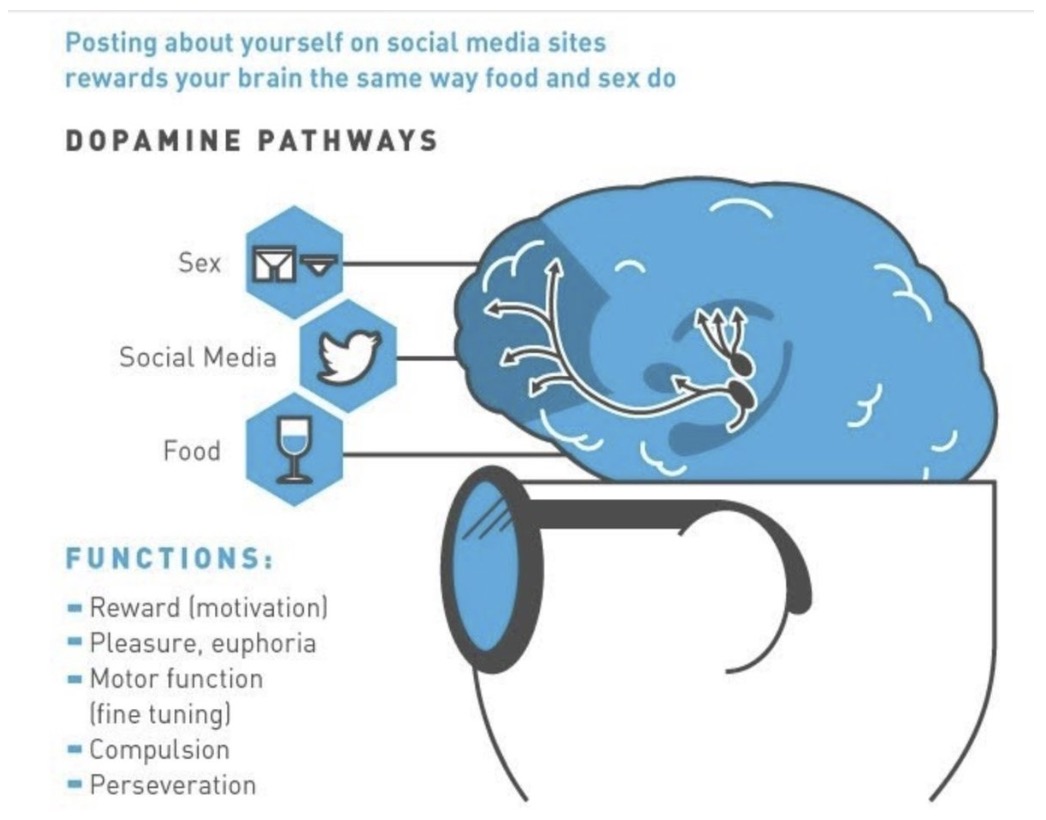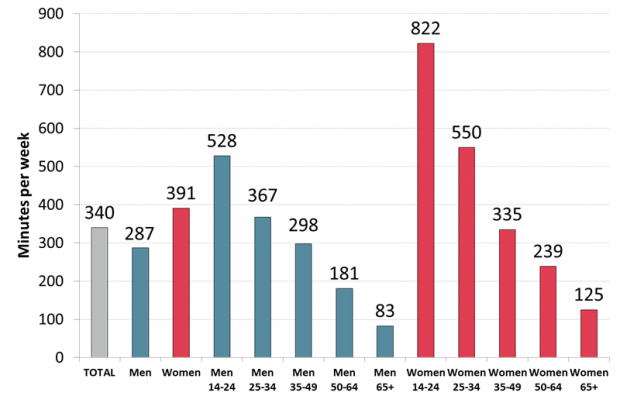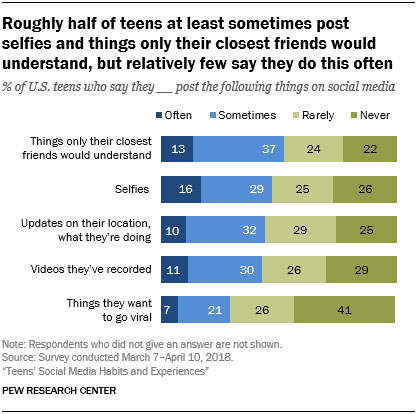Body image is not fixed. Our bodies experience changes as we grow older, and each stage in our lives is associated with body image markers. Maintaining a positive body image is a lifelong process. While we hear a lot about body image issues, we should try to understand the influence of social media on body image among young boys and girls.
To begin with, we need to understand what “body image” is. Body image is an integral part of our self-concept and encompasses how we accept and act about our bodies.
 Scientists have found that social media overuse creates a stimulation pattern similar to that created by other addictive behaviors. Hence, the brain responds to social media the same way it responds to other “rewards” — with a release of dopamine.
Scientists have found that social media overuse creates a stimulation pattern similar to that created by other addictive behaviors. Hence, the brain responds to social media the same way it responds to other “rewards” — with a release of dopamine.
These dopamine rushes are catalyzed when a teen posts something online and is met with likes, shares, and positive comments from their peers.
The current generation, or as we refer to them, the GenZ (born between 1996-2001), is highly influenced by the content available on different social media platforms like Instagram, Facebook, Twitter, Snapchat, Tumblr, etc. The current generation has found a way of living through social media, uploading pictures and videos, and sharing stories, the constant need to maintain a perfect life on social media has greatly influenced how adolescents and young adults look at themselves. Social media has greatly impacted an individual’s body image, eating habits, and overall health and lifestyle. Most importantly, social media has greatly impacted how we look and feel about ourselves.
 “According to Australian statistics from Roy Morgan, Girls aged 14-24 spend 822 minutes on social media each week. Boys aged 14-24 spend 528 minutes a week.’’
“According to Australian statistics from Roy Morgan, Girls aged 14-24 spend 822 minutes on social media each week. Boys aged 14-24 spend 528 minutes a week.’’
Body image is the perception one has about their physical self and the thoughts and emotions one encompasses about themselves. It includes our compassion and recognizing the strengths and qualities that make us unique. The emotions we feel towards our physical self can be positive or negative, or both, and influence how we act toward our bodies. Therefore, it is an integral part of our self-concept and makes or breaks a person.
Instagram influencers or sensations have glamourized specific body types by uploading shots that have been heavily edited and photoshopped. This has created certain ideals of beauty for practically everyone on social media, and individuals go to tremendous lengths to meet those criteria. Normalizing and celebrating hourglass or thin body shapes, airbrushed or glass skin, and gradually drifting from natural and realistic body image. Adolescents exposed to such content most of the time feel pressured to look a certain way to fit in the Instagram-worthy culture. They end up being dissatisfied with their body and how they feel about it, wanting to change certain aspects of it, even though nothing is necessarily wrong with them. Young boys and girls end up hating their bodies or skin, experiencing body dysmorphia. They begin to maintain diets or eat less to achieve a certain body type.
“People end up creating unrealistic ideas for themselves based on what they see and feel distressed when they aren’t able to meet those ideas or self-expectations”
Neha Choudhary, MD, a child and adolescent psychiatrist at Harvard Massachusetts, General Hospital, and Harvard Medical School.
Adolescents fail to differentiate between “reel” and “real” life and mistake the life shown on social media for being true. They are at a sensitive and tender phase where any exposure greatly affects their mind and their perception of the world. From sharing photos to messaging friends on Snapchat and WhatsApp, teens are wrapped up in the bubble of being “online” to feel included.
They’re in a phase where peers play an important role in molding their personalities. The superficial standards set by social media platforms, the pressure to dress up, look a certain way, or have an appealing body type can lead to young minds experiencing body dysmorphia, anxiety, eating disorders, low self-esteem, or confidence about their bodies. The pressure of superficial beauty standards – whether to look a certain way, dress up a certain way, or have a certain appealing body type—on the young mind can lead to body dysmorphia.
According to a survey by Common Sense Media:
Body Dysmorphia or Body Dysmorphic Disorder (BDD), is a mental health illness where an individual focus too much on a perceived flaw in their appearance. They tend to maximize the flaw to an extent where they start hating the way they look or feel about their body. It might be a flaw or defect that is invisible or inconsequential to others but is considered a major imperfection to the person. It is to a point where the person is ashamed or embarrassed by themselves and feels anxious while in a social situation. People with BDD happen to spend a lot of their time looking a certain way, comparing themselves to others, focus too much on minor flaws. There is a certain pressure or unnecessary effort people put in to fit in the Instagram culture, following certain aesthetics, how people go to great lengths to follow or portray a certain lifestyle to put that they can rather show off on Instagram. There are different eating disorders that people develop due to extreme social media influence and pressure to “fit in”. Anxiety and extreme self-consciousness make people focus too much on their natural flaws/ over-exaggerate, or maximize their flaws or imperfections.
Approximately 9-14% of patients in general dermatology clinics have a diagnosis of BDD, and within the cosmetic surgery setting, the prevalence is thought to be even higher.
BDD affects 0.7-2.4% of the general population and a much larger percentage of those attempting to receive aesthetic treatments.
Studies have found that approximately 30% of all requested cosmetic treatments and approximately half of all surgical requests were not obtained, with the most common reason being that the doctor considered the treatment unnecessary and did not provide it.
Whatever the perceived or imagined flaw is, individuals tend to consider themselves ugly and get cosmetic surgery to improve their flaws. This can lead to unhealthy eating habits, anxiety, depression, etc. Teenagers go to lengths to maintain a certain lifestyle, including doing activities they don’t necessarily enjoy doing.
A study conducted in 2015 found that female-identifying college students who spent more time on Facebook had poorer body image. According to the researchers, “Young woman who spends more time on Facebook may feel more concerned about their body because they compare their appearance to others.” Kids develop an intense dislike towards their own lifestyle, and they end up being depressed.
A negative body image can develop from many different influences, including family, peer group, media, and social media influences. Whereas a positive body image can improve self-esteem and self-acceptance, further boosting confidence. Hence establishing a healthy relationship with food and physical activity. Having a negative body image can cause unrealistic expectations of how one’s body should look.
There’s a brighter side to social media as well. Various posts and reels influence people to love their bodies, and people are opening up and discussing various body issues, and mental health, spreading awareness. Some adolescents are not happy with how they look and feel; seeing others doing better than them often influences them to work harder and get in shape. Overweight girls learn about body positivity, loving their body as it is, or even learning about exercising and keeping healthy. Body issues might be built or broken, and that totally depends upon the individual and how he or she is consuming the media.
There are a lot of body-positive influencers who are encouraging teens to accept their normal bodies. Phenomenal male influencers are talking about body acceptance and personality building. Puberty is normal, gaining extra pounds are normal, bloated bellies are normal, and so is a change of voice for boys during puberty. One should not try to change just because societal norms expect them to do so. Instead, one should change to better themselves to be happy. Social media should not be considered a standard of life or a place to compare the lives of celebrities. No matter how positive social media is, in the end, the negative impacts suppress the positive ones.
 According to a report released in 2021 by Common Sense Media on social media’s effects on teens, about half of the 1,500 young people surveyed said social media is very important for them to get support and advice, feel less alone, and express themselves creatively.
According to a report released in 2021 by Common Sense Media on social media’s effects on teens, about half of the 1,500 young people surveyed said social media is very important for them to get support and advice, feel less alone, and express themselves creatively.
According to a Pew Research poll, a survey of teens found that 70 percent of them hide their online behavior from their parents.
